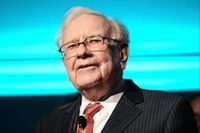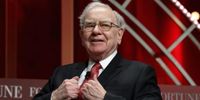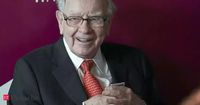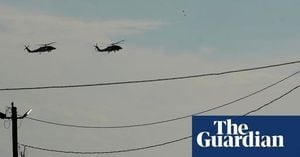The S&P 500, widely viewed as a benchmark for the broader U.S. market, has now dropped over 11% from its February peak, officially entering correction territory — a decline of 10% or more from recent highs. Investors and economists alike worry that escalating trade tensions may stoke inflation and derail economic growth, with some warning of a looming recession if the situation escalates further. While the mood in the markets remains tense, legendary investor and Berkshire Hathaway chairman Warren Buffett has long advised restraint during turbulent times.
In his 2017 letter to shareholders, Buffett reminded readers that while no one can predict how far markets may fall in the short term, staying level-headed is key. He encouraged investors to turn to the timeless wisdom of Rudyard Kipling’s poem "If," quoting: "If you can keep your head when all about you are losing theirs... Yours is the Earth and everything that’s in it." As volatility continues, Buffett’s message remains clear: patience, discipline, and perspective are the most valuable assets in a fearful market.
Indian stock markets plunged on Friday, April 4, 2025, following a global selloff sparked by renewed recession concerns and aggressive tariff proposals from former U.S. President Donald Trump. The Sensex tanked 930 points (1.22%) to close at 75,364, while the Nifty50 fell 345 points (1.49%) to end at 22,904. The selloff was broad-based, dragging all sectoral indices into the red, with metal, pharma, and IT stocks suffering the most. The total market capitalization of BSE-listed firms shrank by Rs 9.5 lakh crore to Rs 403.83 lakh crore. Sun Pharma, Lupin, Laurus Labs, and Aurobindo Pharma dropped as much as 7.2%.
This week, President Trump’s new tariffs sent shockwaves through the stock market, triggering a sharp sell-off as investors reacted to escalating trade tensions between the U.S. and China. The Dow Jones Industrial Average plunged 1,400 points, marking one of its steepest declines in years. As the Magnificent 7 tech stocks – Amazon, Apple, and Tesla among them – slid, concerns about price increases and supply chain disruptions began to grow.
In times like these, many investors look for guidance when the market turns volatile. Warren Buffett, the chairman of Berkshire Hathaway, has some advice when market declines occur: Stay calm and avoid panic. In his 2017 shareholder letter, Buffett stressed the importance of sticking to a long-term strategy, regardless of how volatile the market becomes. "When major declines occur ... that’s the time to heed these lines," Buffett noted, pointing to Kipling’s poem. He added that the market will always experience ups and downs, and investing involves the risk that the expected objective won’t always be attained. "The light can go from green to red without pausing at yellow," he said.
As Trump’s tariffs continue to rattle markets, create uncertainty, and spark volatility, Buffett’s advice is more relevant than ever. The legendary investor has previously likened the tariffs to "an act of war," partly because "the Tooth Fairy doesn’t pay ‘em!" This sentiment resonates deeply with investors as they navigate the choppy waters of the current economic landscape.
Buffett socked away $321 billion while waiting for stocks to crash like they did on Thursday. The legendary investor specializes in buying cut-price assets during periods of market panic. Buffett famously says to "be greedy when others are fearful" and "when it rains gold, put out the bucket, not the thimble." The downturn is likely to hearten the Berkshire Hathaway CEO, given he's a value investor who seeks to buy businesses at a discount to their worth.
However, Buffett might not be buying just yet. President Trump’s declaration of a near-universal 10% tariff on foreign goods vaporized $2.4 trillion from the S&P 500 on Thursday. The benchmark stock index tumbled further on Friday, April 4, 2025. Some of Buffett's favorite stocks, including Apple, American Express, Bank of America, and Occidental Petroleum, all sank more than 9%. Buffett's longtime secretary, Debbie Bosanek, told Business Insider in a statement: "Mr. Buffett is not doing interviews but instead is saving his commentary for the Q&A session on May 3 which is held before the Berkshire Annual Meeting."
Buffett has offloaded a net $158 billion of stocks over the past two calendar years. Berkshire's cash pile has roughly tripled from under $110 billion in September 2022 to $321 billion at the end of 2024, which is bigger than Coca-Cola's market value. Armed with an overflowing war chest, Buffett appears well-placed to wade into the market rout and scoop up stocks on the cheap.
The internet is rife with comments and memes about Buffett sitting pretty while markets are in chaos. Wall Street has also rewarded Buffett's cash hoarding: Berkshire's stock price is up about 15% this year, trouncing the S&P's near-11% decline. The share surge has added $23 billion to Buffett's personal fortune, vaulting him past the likes of LVMH's Bernard Arnault and Oracle's Larry Ellison into fourth place on the Bloomberg Billionaires Index.
Yet the famously patient and disciplined investor might wait longer before pouncing. "When prices fall, it certainly encourages Buffett to buy unless he views new permanent damage greater than the price discount," Steven Check told Business Insider. He oversees $2 billion of assets as the CEO of Check Capital Management and has attended every in-person Berkshire annual meeting since 1996.
Buffett's followers will likely have to wait until Berkshire's meeting in May or its second-quarter portfolio update in August to learn whether the investor topped up his holdings this week. Steve Hanke, a professor of applied economics at Johns Hopkins University who has been teaching Buffett-style valuation to students for decades, told Business Insider he's "watching his next move with the most careful and anxious attention" as it will "tell us a great deal about where he thinks the economy is going."
If Buffett plunges into the market and starts buying, it will signal that he believes the Trump tariffs were nothing more than a minor economic annoyance that created wonderful buying opportunities. If he holds off, it would suggest he's keeping in mind the Smoot-Hawley tariffs of March 1930, which "broke the back of the stock market, and helped to plunge the world into the Great Depression." Hanke's "tentative guess" is that Buffett's knowledge of economic history will lead him to "remain on the sidelines, at least for a while" until the scope of what he's dealing with grows clearer. If the frantic selling in markets continues, Buffett's moment might come sooner rather than later.







